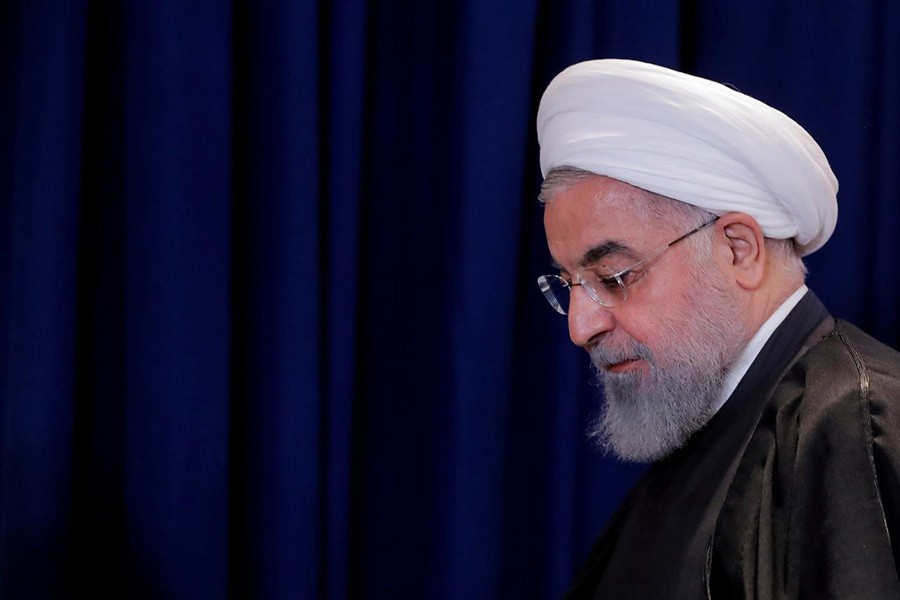
Abdur Rahman Chowdhury from Falls Church, Virginia, USA
Published :
Updated :

Iran-America antagonism reached an all-time high during the weekend following the attack on the American surveillance drone by Iran on June 20. Iran claimed that the drone was transgressing its airspace when it was shot down by a surface-to-air missile. Washington denied that the drone had entered Iranian airspace but felt relieved that there was no casualty. President Trump considered it a mistake and added that the attack might not have had Iran's top political leadership's approval. The hawks in the Trump administration were longing to launch military strikes against Iran and attended a series of meetings at the White House on Sunday (June 23). Though Trump opted against a military response, he nonetheless announced new round of sanctions against Iran.
The current phase of antagonism between Washington and Tehran began six weeks ago. A Norwegian cargo vessel and a Japanese oil tanker were hit by grenade at the Gulf of Oman. Washington lost no time in pointing finger at the Iranian Revolutionary Guards for the sabotage. The European leaders, though expressed dismay at the damage of the vessels in international water, sought credible evidence of the complicity of Iran's Revolutionary Guards. Japanese Prime Minister Abe was in Tehran on a mediation mission when the Japanese vessel came under attack. He downplayed the incident and sought tangible evidence about the perpetrators.
Tehran denied any involvement in the attacks on the foreign vessels and justified its rescue mission in the Straight of Hurmuz since it falls within Iran's boundary.
Mike Pompeo, Foreign Secretary and John Bolton, National Security Advisor made series of incendiary remarks alleging Iranian involvement in the incident. They urged tougher action against Iran and suggested US navy provide escort to commercial vessels passing through the Gulf of Oman. The Trump administration ordered deployment of 1,000 military personnel in the region to circumvent further Iranian provocation. In the meantime, Patrick Shanahan, the acting Defence Secretary resigned from his job creating a void in the Pentagon. Trump is likely to appoint a hawkish general to lead the Pentagon.
Both Pompeo and John Bolton have gone out on missions to the Gulf region and the Middle East to seek support on US action against Iran.
Iran-US antagonism dates back to 1979 when the people of Iran rose in uprising against the despotic rule of Reza Shah Pahlavi. As the mass uprising turned widespread and violent, Ayatollah Ruhullah Khomeini returned to Tehran and installed the Islamic Republic.
President Trump has chosen a belligerent policy towards Iran. In 2017 he withdrew from the Joint Comprehensive Plan of Action (JCPOA) popularly known as Iran Nuclear Deal. JCPOA was painstakingly negotiated by the United States and five other countries including Germany in 2015. The Obama administration spearheaded the negotiation and with the help of European allies successfully orchestrated an agreement restraining Iran from the pursuit of nuclear weapons. The deal was hailed internationally and the United Nations Security Council unanimously welcomed the agreement. The international economic sanction imposed on Iran was revoked and European countries especially France, Germany and Italy enthusiastically moved forward to invest in the infrastructure development in Iran. Israel was the only country that vehemently opposed the deal and termed the Iran nuclear deal a threat to peace in the region.
Trump during the presidential campaign characterised the nuclear deal as the worst agreement ever made in history. Nobody claimed that the JCPOA was without any shortcoming. But it restrained Iran from immediate possession of nuclear arsenals. The signatories of the agreement and the IAEA (International Atomic Energy Agency) felt contented that Iran was compliant to the terms of the agreement. The scope of making further improvement rested in adhering to the agreement and suggesting necessary amendment while moving forward. By withdrawing from the agreement, the United States lost the opportunity to seek further improvement. Instead, it created a crisis and resorted to futile options. Trump's advisors seem to believe that sanctions would ultimately lead to Iranian capitulation or cause change of regime. But this has not happened in Iraq or in Cuba and it will never happen in Iran.
Trump's Iran policy is merely a pressure tactic aimed at inflicting maximum hardships on the population with the expectation that people would overthrow the regime and install a pro-American pluralistic society. There is zero chance for this to happen. The previous US sponsored regime change tactic resulted in failed states in the region and took a heavy toll of American lives.
Mike Pompeo announced a list of demands as an exit strategy from the present crisis which include halting all nuclear development programmes and ceasing proxy actions in Yemen, Syria, Lebanon, Iraq and Afghanistan. This is a call for capitulation.
Trump administration does not seem to recognise the reality that following Iraq invasion, Iran has emerged as a regional super power. It wields considerable influence in the region starting from the Gulf States to Lebanon. The inept handing of Syrian crisis has further enhanced Iran's status in the region. It is in the interest of the United States and Europe to cultivate friendly relations with Iran. A prosperous Iran would play a responsible role in the region. This was the underlying presumption of JCPOA and the international community was moving in that direction. It is not too late to accept the reality, revoke sanctions and help Iran rebuild its economy.
Washington buried its acrimonious relations with China and Vietnam and both are now important trading partners of the United States. Persian poet Rumi had laid out a way forward: "Out beyond ideas of wrong-doing and right-doing, there is a field. I will meet you there."
Abdur Rahman Chowdhury is a former official of the United Nations.


 For all latest news, follow The Financial Express Google News channel.
For all latest news, follow The Financial Express Google News channel.